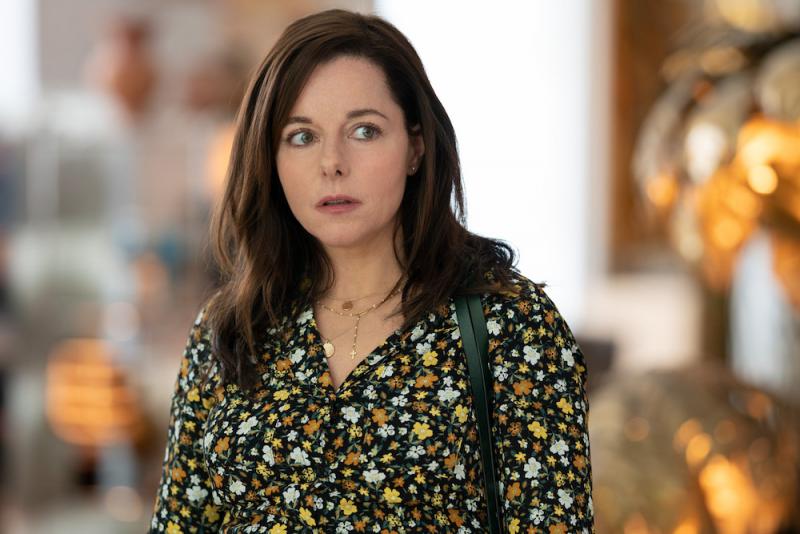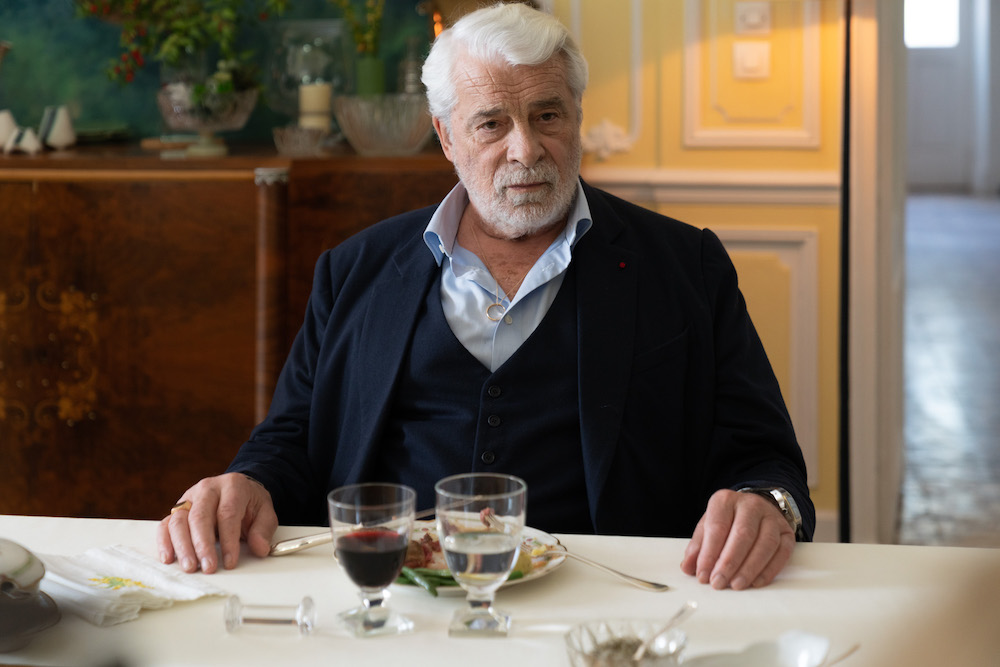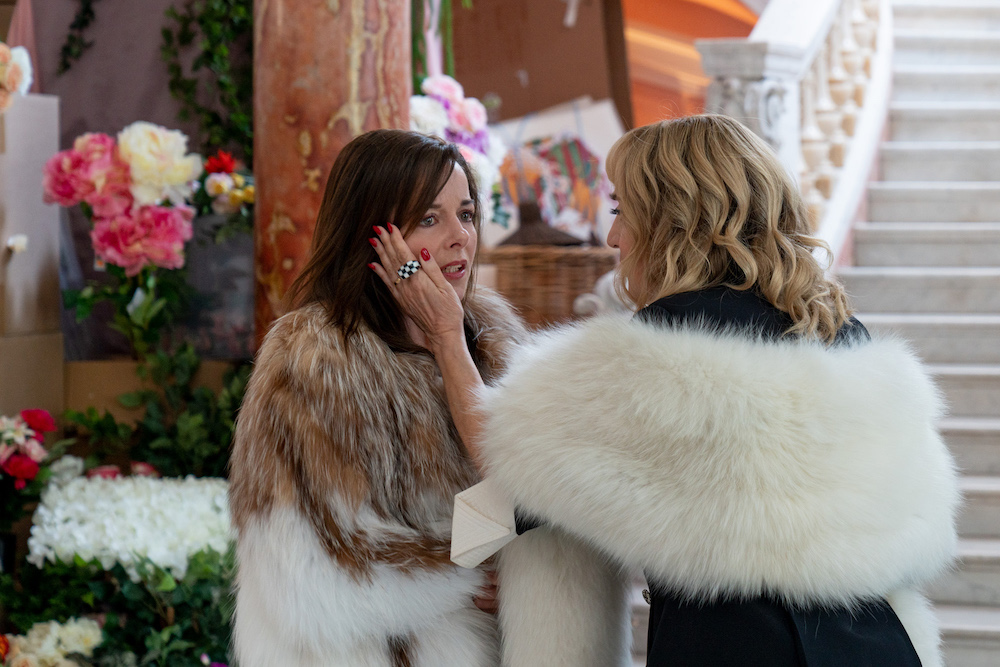The Origin of Evil review - Laure Calamy stars in gripping French psychodrama | reviews, news & interviews
The Origin of Evil review - Laure Calamy stars in gripping French psychodrama
The Origin of Evil review - Laure Calamy stars in gripping French psychodrama
Sébastien Marnier directs an excellent cast in a story of shifting identities

A young woman (Laure Calamy; Call my Agent!; Full Time; Her Way) is trying to pluck up the courage to call her father, who she’s tracked down and has never met. Her voice trembles, she can barely speak, she has to hang up. But finally she manages it. This is Stéphane, she murmurs. May I speak to Serge?
Written and directed by Sébastien Marnier (Faultless; School’s Out), this thriller has an excellent cast and looks wonderful, although the plot-line is somewhat preposterous and soap-opera-esque. Nevertheless, it’s stylish and gripping, and it’s not until half-way through that we realise that the seductive, jittery Stéphane is not quite what she seems. But let us have no spoilers here.
There’s no denying that she’s down on her luck, though perhaps she always is. She works in a fish plant packing anchovies – the smell follows her and she’s always washing her underarms with a flannel. She’s in a complicated, sometimes violent relationship with a prisoner (Suzanne Clément), who may have killed a previous girlfriend. She visits her frequently, and it’s often hard to tell the difference between the prison and the plant. Then she’s suddenly made homeless when her landlady (perhaps they’re also having an affair) needs her room. Time to make that phone call.
 Serge (a powerful Jacques Weber, pictured above) waits for her at the harbour on the island of Porquerolles, a beautiful spot off the Côte d’Azur where Godard’s Pierrot le Fou was partly filmed. He is a bulky, imposing chap with a fine head of white hair, though frail after a stroke (shades of Succession). He seems strangely welcoming and unquestioning about this new daughter – he’s always been a womaniser – and invites her to lunch. It soon transpires that he is immensely rich, owning restaurants, hotels and golf courses.
Serge (a powerful Jacques Weber, pictured above) waits for her at the harbour on the island of Porquerolles, a beautiful spot off the Côte d’Azur where Godard’s Pierrot le Fou was partly filmed. He is a bulky, imposing chap with a fine head of white hair, though frail after a stroke (shades of Succession). He seems strangely welcoming and unquestioning about this new daughter – he’s always been a womaniser – and invites her to lunch. It soon transpires that he is immensely rich, owning restaurants, hotels and golf courses.
The family home is packed to the gills with extraordinary objects – lots of taxidermy, trailing plants, leopard print and bizarre lamps, as well as piles of cardboard boxes - mainly as a result of his wife Louise’s obsessive spendaholic habit. She (Dominique Blanc) is gloriously eccentric, vain and glam and has an enormous, pointless collection of videotapes. George, their daughter (Doria Tillier), is glacial and suspicious, while her teenage daughter Jeanne (Céleste Brunnquell) prowls about silently taking photographs of everyone.“Family is like poison. It makes you sick,” Jeanne tells Stéphane in a rare moment of intimacy. "It's the worst thing in the world." They’re only here temporarily and on sufferance, supporting Louise after Serge’s stroke. A stuffed wolf looks on balefully.
Stéphane is suitably overawed by these surroundings, smiling nervously and offering to help Agnes, the grim maid (Véronique Ruggia Saura), who’s been with the family for decades. But, when George asks about her job, she says without hesitation that she owns the fish plant and has 40 employees. So lying comes easily to her, it seems, and we can’t help feeling that George is right to tell her to never come back.
 But Serge is determined to use Stéphane to protect him from the machinations of his wife and daughter, who are trying to take over his business and to prove in court that he’s unfit to run it. He wants her to testify in his favour and ruin their guardianship scheme. At first, Stéphane, who comes to stay in spite of George’s misgivings (she demands to see Stéphane’s identity card, as if that would solve everything. Has no one here heard of a DNA test?) is full of sympathy. But Serge is perhaps not the charming, put-upon pater familias that he appears. In fact maybe he’s a monster.
But Serge is determined to use Stéphane to protect him from the machinations of his wife and daughter, who are trying to take over his business and to prove in court that he’s unfit to run it. He wants her to testify in his favour and ruin their guardianship scheme. At first, Stéphane, who comes to stay in spite of George’s misgivings (she demands to see Stéphane’s identity card, as if that would solve everything. Has no one here heard of a DNA test?) is full of sympathy. But Serge is perhaps not the charming, put-upon pater familias that he appears. In fact maybe he’s a monster.
Alliances shift. Stéphane ignores her despairing girlfriend’s calls, though their destinies are deeply entwined. Louise, as well as Serge, wants Stéphane to stick around, finding her “wholesome” and taking pleasure in correcting her grammar, as well as hoping she can fill the loneliness that will descend when George and Jeanne go back to Australia. She even gives her a fox-fur coat (pictured above).
The tension mounts, as does the violence; so do the split screens. There are hints that Stéphane might end up as a skivvy, in spite of the bevy of women seeming to welcome her towards the end. The smell of poverty and prison, as well as fish, follows her. Calamy’s performance is central, and, as she makes mistake after fatal mistake, her character becomes more and more ambiguous – and fascinating.
The future of Arts Journalism
You can stop theartsdesk.com closing!
We urgently need financing to survive. Our fundraising drive has thus far raised £49,000 but we need to reach £100,000 or we will be forced to close. Please contribute here: https://gofund.me/c3f6033d
And if you can forward this information to anyone who might assist, we’d be grateful.

Subscribe to theartsdesk.com
Thank you for continuing to read our work on theartsdesk.com. For unlimited access to every article in its entirety, including our archive of more than 15,000 pieces, we're asking for £5 per month or £40 per year. We feel it's a very good deal, and hope you do too.
To take a subscription now simply click here.
And if you're looking for that extra gift for a friend or family member, why not treat them to a theartsdesk.com gift subscription?
more Film
 London Film Festival - from paranoia in Brazil and Iran, to light relief in New York and Tuscany
'Jay Kelly' disappoints, 'It Was Just an Accident' doesn't
London Film Festival - from paranoia in Brazil and Iran, to light relief in New York and Tuscany
'Jay Kelly' disappoints, 'It Was Just an Accident' doesn't
 Iron Ladies review - working-class heroines of the Miners' Strike
Documentary salutes the staunch women who fought Thatcher's pit closures
Iron Ladies review - working-class heroines of the Miners' Strike
Documentary salutes the staunch women who fought Thatcher's pit closures
 Blu-ray: The Man in the White Suit
Ealing Studios' prescient black comedy, as sharp as ever
Blu-ray: The Man in the White Suit
Ealing Studios' prescient black comedy, as sharp as ever
 The Woman in Cabin 10 review - Scandi noir meets Agatha Christie on a superyacht
Reason goes overboard on a seagoing mystery thriller
The Woman in Cabin 10 review - Scandi noir meets Agatha Christie on a superyacht
Reason goes overboard on a seagoing mystery thriller
 London Film Festival 2025 - crime, punishment, pop stars and shrinks
Daniel Craig investigates, Jodie Foster speaks French and Colin Farrell has a gambling habit
London Film Festival 2025 - crime, punishment, pop stars and shrinks
Daniel Craig investigates, Jodie Foster speaks French and Colin Farrell has a gambling habit
 I Swear review - taking stock of Tourette's
A sharp and moving tale of cuss-words and tics
I Swear review - taking stock of Tourette's
A sharp and moving tale of cuss-words and tics
 A House of Dynamite review - the final countdown
Kathryn Bigelow's cautionary tale sets the nuclear clock ticking again
A House of Dynamite review - the final countdown
Kathryn Bigelow's cautionary tale sets the nuclear clock ticking again
 theartsdesk Q&A: Idris Elba on playing a US President faced with a missile crisis in 'A House of Dynamite'
The star talks about Presidential decision-making when millions of lives are imperilled
theartsdesk Q&A: Idris Elba on playing a US President faced with a missile crisis in 'A House of Dynamite'
The star talks about Presidential decision-making when millions of lives are imperilled
 Urchin review - superb homeless drama
Frank Dillane gives a star-making turn in Harris Dickinson’s impressive directorial debut
Urchin review - superb homeless drama
Frank Dillane gives a star-making turn in Harris Dickinson’s impressive directorial debut
 Mr Blake at Your Service review - John Malkovich in unlikely role as an English butler
Weird comedy directed by novelist Gilles Legardinier
Mr Blake at Your Service review - John Malkovich in unlikely role as an English butler
Weird comedy directed by novelist Gilles Legardinier
 Don't Let's Go to the Dogs Tonight review - vivid adaptation of a memoir about a Rhodesian childhood
Embeth Davidtz delivers an impressive directing debut and an exceptional child star
Don't Let's Go to the Dogs Tonight review - vivid adaptation of a memoir about a Rhodesian childhood
Embeth Davidtz delivers an impressive directing debut and an exceptional child star

Add comment